---------------------------------------------------------
Ducks bring so much fun & joy to the farm yard! With their giant floppy feet, the way they waddle across the yard, and the sheer joy they get from splashing in a kiddie pool, ducks really are a great addition to any farm! While many backyard farmers start out with chickens, ducks certainly can live alongside your chickens. (click here to read about raising ducks and chickens together) Raising ducks is a bit different. Check out my tips for raising healthy and happy ducks!
Water, water, and more water
Ducks and water go hand in hand. One of the most important things you can do for the health of your ducks is to provide them with an unlimited source of clean, fresh water. They don’t need a giant pond or even a little pool. What they absolutely do need is a clean water source.
They need to have water available to digest their food, they need to be able to dunk their head in the water to clear their nostrils and keep their eyes clean, and they need to be able to preen in the water to activate the oil gland at the base of their tail. A large dog or livestock bowl will do the trick at minimum.
Each duck will drink about 4 cups of water each day. So if you have a small flock of just 4 ducks that is one gallon of water just for drinking, every day.
The ducks *will* dirty that water, and they will do it faster than you might think possible! When you keep ducks there is no way to keep them from climbing into their water bowl for a little swim. They will toss sand, rocks, and dirt in the water and drop food in it as they are eating.
To keep your duck water clean, I recommend doubling the bare minimum amount (so 8 cups per bird). Each day give the bowl a quick scrub with a brush & splash of vinegar, dump the old water and fill it up with fresh water. I like to keep a brush hanging right by the bowl to make this quick and easy.
If you have space to give them for swimming they will absolutely LOVE it. You don’t have to dig a huge pond, a tiny kiddie pool will work just fine. The water will be gross and you will just have to accept that for your own sanity. It will be clean for maybe the first 10 minutes after you fill the pool, but then all bets are off. By the end of the day, it will be dark and muddy looking. The good news is the ducks don’t care!
If you have just a couple of birds, you could probably dump the pool every couple of days. When your flock gets bigger though it will likely be an everyday chore. A small pool works out well because they are easy to dump and quick to refill with a hose. About once a week, I like to scrub the pool out with a scrub brush and a little vinegar to keep the algae at bay.
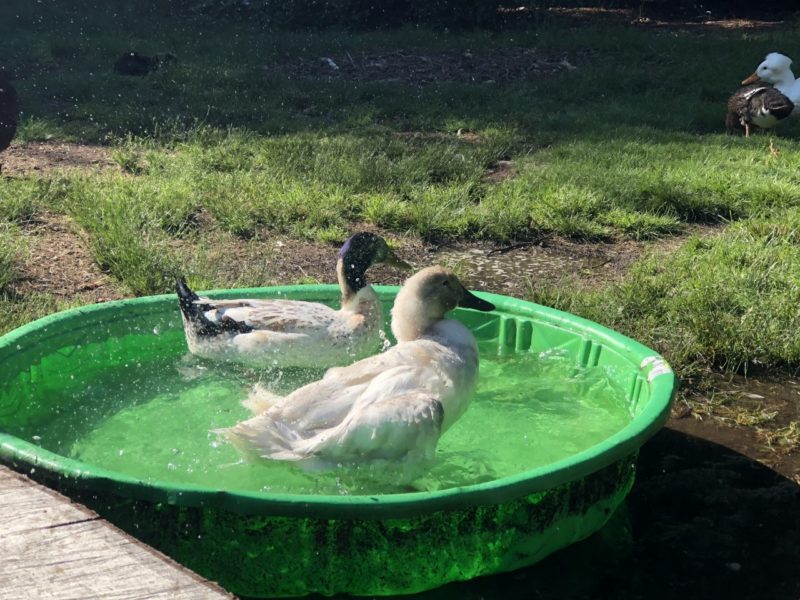
Quality feed
If you can find waterfowl feed and you are only keeping ducks that is the way to go. Most people that keep ducks also have other poultry in the yard and feed their birds layer pellet or crumble. Adult ducks will do just fine with a chicken or mixed flock layer feed.
A pair of adult ducks will go through about a pound of feed each day. When raising ducks on mixed flock feed, keep in mind that when your ducks are young they will need extra niacin in their diet. click here to read more about ducklings & niacin
Ducklings grow much faster than chicks and the niacin helps support their fast growing bones. An easy way to give them what they need is to mix in some brewer’s yeast with their feed until they are fully grown.
Ducks should never be offered feed unless there is a source of water to go with it, it could result in choking on the dry feed. click here to read more about feeding your ducks
Bugs, Greens, & Calcium
Ducks are not vegetarians, they enjoy a large range of insects. They are never happier than when they can dig with their bill in a mud hole looking for worms, slugs, or other creepy crawlies.
My ducks enjoy catching flies and are quite good at it! They will wait for the flies to congregate on a pile of poop in the grass, then lower their neck and run at them with their beaks open scooping up flies like a game of Hungry Hungry Hippos!
If at all possible, let your ducks out in a grassy area to free range every day. If free ranging is not safe for your area, they will love a treat of meal worms or live crickets from the pet store.
Providing fresh leafy greens each day helps round out their diet. Particularly if your birds can’t get out to free range (or in the winter when green grass and leaves are unavailable), tossing them some leafy greens or vegetables will ensure they are getting all their vitamins.
Ducks love it when you float greens or herbs in their pool or water dish. It helps the greens stay fresher, and mimics their natural instincts for fishing greens out of a weedy pond. Some veggies to try include romaine lettuce, kale, corn, peas, cucumber, and many herbs including oregano, rosemary, basil & parsley. Click here to read more about treats for your ducks
When hens are of laying age their bodies use up a lot of calcium preparing the eggshells. If they are not getting enough calcium in their diet, they will lay fewer eggs, lay eggs with weak, thin shells, or begin to have weak bones as their body “steals” from their calcium reserves to produce eggs. If you have laying ducks you should always keep a bowl of either oyster shells or crushed egg shells out for them to eat as needed. You will notice that the males, babies, & senior females mostly ignore the bowl of shells, but the young hens will enjoy them.
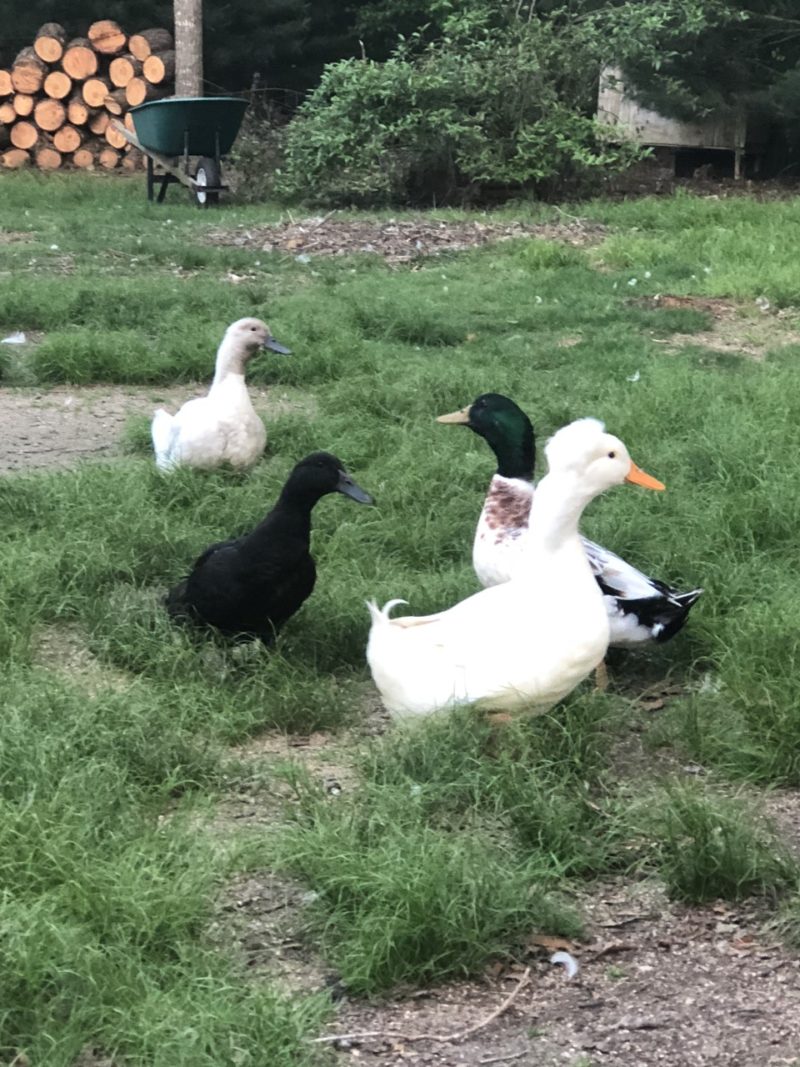
Shelter from predators
Domesticated duck breeds have been bred for generations to be much larger than their wild counterparts. The reason for this is twofold. One is obvious, bigger birds mean more meat. The second is so that they will be too fat to fly away from their farms.
Ducks in general are quite slow on land. Their floppy, webbed feet and short, squat legs are not meant for running. To escape predators, wild ducks take to the water or to the sky. Ducks on a farm don’t often have a huge pond to swim away on and are too big-boned to fly off. Domesticated ducks need to be provided protection.
If your birds free range, make sure there are places they can hide like large bushes and tall grasses. At night they should be locked up in a secure run or coop. Ducks enjoy sleeping outdoors year round so as long as your run is secure (totally surrounded including buried wired and a solid roof) you can let them sleep in the run with a small house (think dog house) where they can retreat to if they want. If your run is not secure, you will want to close them up in a coop at night.
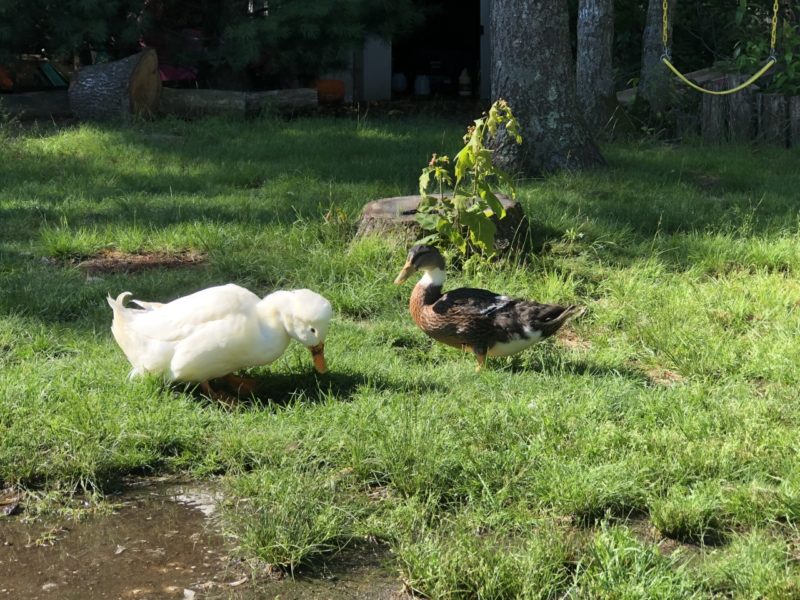
Health Issues
Ducks are really healthy animals and rarely will give you issues. Parasites are generally not a problem thanks to the amount of time spent in the water, and they are extremely cold hardy. It is still a good idea to keep a stocked first aid kit so you will be prepared in an emergency. Click here to see what I keep in my duck first aid kit
Friends
Ducks are really social! Ducks are meant to live with other ducks, they will be sad and quite anxious if you only keep one duck. A trio of ducks will be quite happy waddling about your farm. Although my ducks live with the chickens, they keep to themselves and don’t really socialize with the chickens.
If you will only be keeping a few ducks, I would recommend going with all females. Tossing a male into the mix will mess with the group harmony. If you keep a male you should have at least 3-4 females with him so he doesn’t over mate a single female. Males can also be territorial, particularly during mating season. When it’s not mating season, however, most drakes are quite nice and much easier to keep than a rooster! click here for more tips on living with drakes
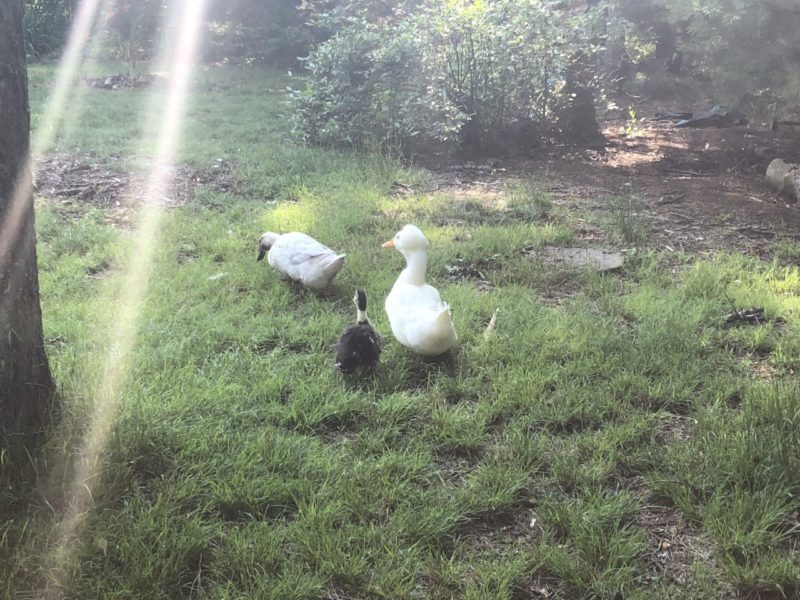
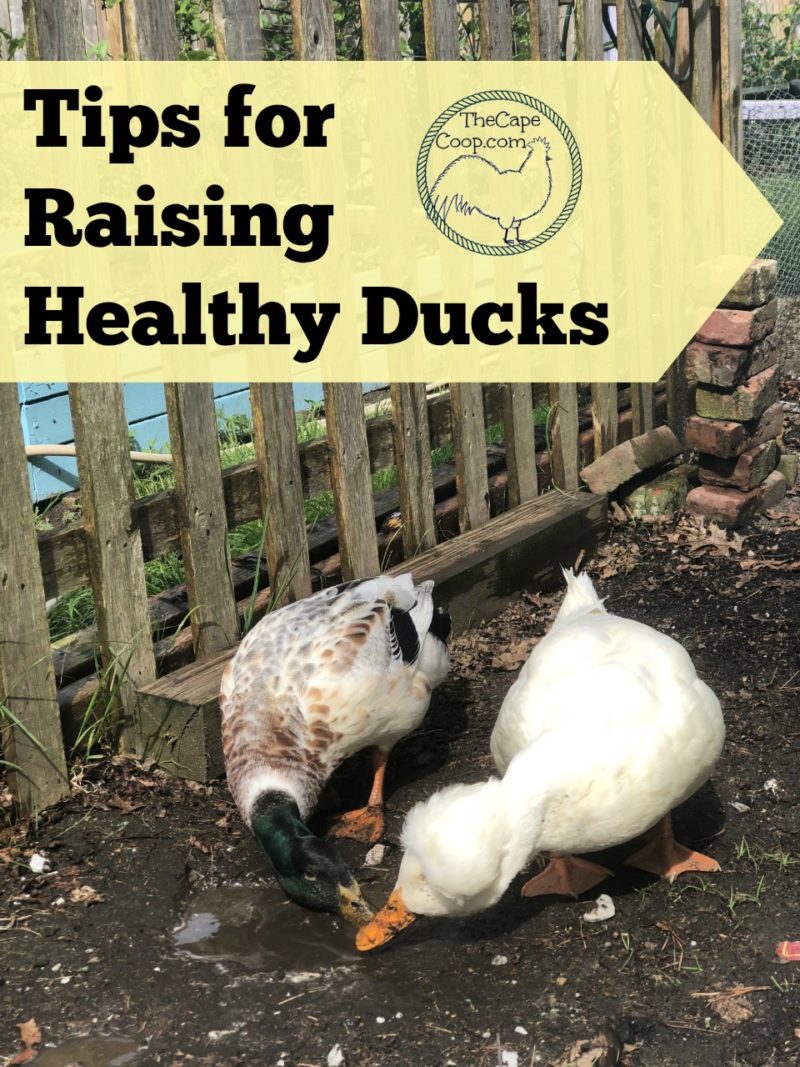

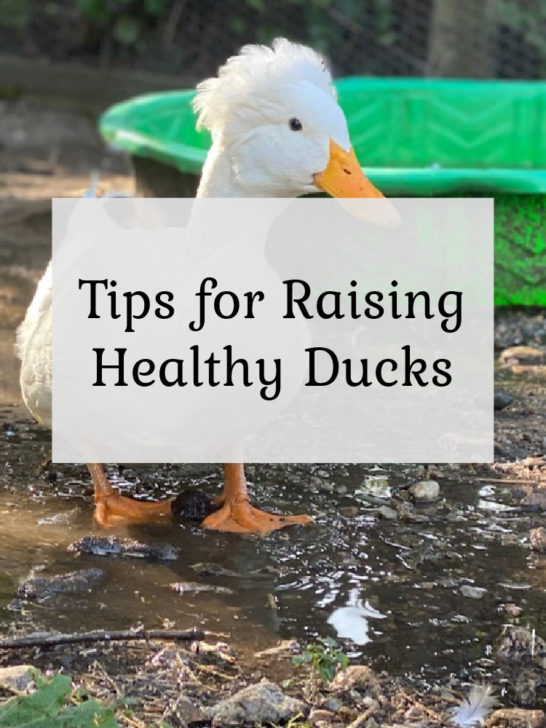



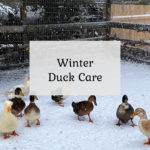
Debbie
Friday 17th of May 2024
Hi. I originally got 3 ducklings. I was just starting and knew nothing. Had 2 males and 1 female. They were fine. One of the males got killed by a coyote. So last year the female went broody and only 1 egg hatched. She didn't want the baby, so I brought it in to raise. I got 3 more at tractor supply because they just had babies come in. It was hard integrating them all with the existing 2 ducks. Finally everyone decided to get along. Unfortunately, I got 1 male and 3 females. So this spring, the new male loves mating with the old female. She's now keeping away from all the ducks and doesn't like any of the new ducks. So she stays alone all day. I have a big yard and a nice pen. I worry that she's lonely. She does ok with the chickens. She has 2 troughs to swim in. She doesn't attack the other ducks, just won't go with the flock. For some reason, she never liked the huge pond I have. Is there anything I can do? Would appreciate any advice. Thanks, Debbie
Liz
Friday 17th of May 2024
Unfortunately there isn't much you can do to make your old duck enjoy the company of the younger ones. Hopefully once breeding season slows down and the young male isn't in crazy mating mode she can hang around with the younger ones again. Sounds like she has a pretty great set up. It can be hard when one is singled out but it sounds like it's her own doing. If she seems unhappy with the situation you can try to force her to bond with one of the younger females. You would keep them together, just the two of them, in their own pen for a couple weeks. Most times once the distraction of the male and larger flock is taken away, the two females will become friends and continue to hang out once you release them back into the flock. But if she is eating and drinking and exploring on her own, she is likely fine, just enjoying some independance.
Nicol
Thursday 6th of May 2021
Hi. You are so amazing to respond to all of this! I so appreciate it! I’m sorry I’m just now seeing this. I gave some brewers yeast but not for most of that year. I’ll restart it. She eats the worms aggressively, getting more than anyone else. I’ve watched them for hours and hours and there isn’t a food competition thing. It’s more like (though this is a little better for the last week), when they waddle over to eat, she dips her bill in and then waddles away. I will get dried grubs. I’ve never seen those at the feed store. And I’ll read the article about niacin. The meal worms aren’t cheap and I’ll rolling through them. Maybe the grubs will be cheaper. I’m feeding about 6 big handfuls of meal worms / day right now. How do you know how much a certain breed of duck should weigh? (She’s a Cayuga, and I also have Welsh Harlequin’s). The only other odd thing about her is that she got very white spotted this winter and she wasn’t even one yet. Is that normal? I thought that happened as they aged. It made me wonder if she has some fast aging syndrome!
Liz
Friday 7th of May 2021
Cayugas are one of the lighter breeds, she should be 6-7 pounds. My Cayuga got white spots very early also, it seemed to be that when she would lose feathers (from the males mating usually) they would regrow as white! So she ended up with a long white strip down the back of her neck from the boys. And it seemed each time she molted she had more white.
Nicol
Friday 30th of April 2021
Hi. I have a year old duck, Betty, that is skinny, not eating enough, and is limping. Then she started flopping on her breast and I took her to the vet. She said she was egg bound. Removed the egg manually. Said the egg was “massive” but it’s the same size of all of the ducks egg. She said Betty was skinny and needs to eat more. We did a fecal sample - normal. 2 sets of xrays, 2 diff days - egg bound the first time, second time said she didn’t see an egg, but maybe a soft egg or a swollen uterus. Said she had lots of follicles, but my ladies lay daily. She encouraged me to give her Deslorelin to suppress follicles for 9 months. But I don’t love that idea. She’s only been egg bound once. She told me to give her meloxicam daily (and to throw away all of her eggs for 2 months after she stops it). This would mean throwing all 3 ducks eggs away for 2 months since they live together. I was on the fence about the meloxicam, but one day after I started giving it to her, she started laying again. So her reproduction seems good for now, but she’s still limping, though mostly keeping up with the group and doing everything else normal - except she is skinnier than the rest. No one knows why she’s limping. Should I give the meloxicam??? Lastly - regarding the eating. They are on Mazuri - i feed as much as they’ll eat in the morning, in a big bowl, with water - to soften it. Then at night I put some in their water bucket. The vet sent me a link for the spruce, saying I could try live earthworms, tadpoles, salmon eggs, etc. What do you think I can do to get this duck eating? The only food she loves is dead meal worms. I love Betty and I’ve already spent over $700 on her. I really want to help her - just not sure the best way and don’t have total confidence in the vet’s plan.
Liz
Friday 30th of April 2021
Wow, sounds like you have been on quite a journey with this little one! I am not a vet, so generally I like to defer to their experience and knowledge. It makes sense that after being egg bound her reproductive system would need a little rest to get over the trauma so I'm not surprised to hear there was swelling. I'm glad she is back to laying daily.
Did she have niacin supplements for the first year while she was growing? Niacin deficiency is a common cause of weakness in the legs. For some reason, some ducks just seem to need more than others so it's also common to have just one duckling among a group to have the deficiency even if they are eating the same diet. The worse the deficiency the worse the weakness and can end up as limping or completely not being able to use the leg. Has your vet discussed with you supplementing her niacin (vitamin b6)? You can do this by adding brewer's yeast to her food (it won't hurt the other ducks, they will just excrete any additional niacin their body doesn't need), or you can give her liquid niacin direct into her bill. You can read more about ducks & niacin here: https://thecapecoop.com/ducklings-niacin/
I wonder if the limping and skinniness are related. Perhaps it's just painful for her to walk or stand so just doesn't eat as much. Mazuri is a great brand of feed, so I wouldn't switch that. Meal worms & dried grubs are my duck's favorite treats. They also love peas, romaine lettuce, melon, & cucumbers. The dried insects are a good choice to help her gain weight because they are high in protein. Does she have any issue competing with the other ducks? Is it possible she is just too slow and they eat it all? If I were you I would start supplementing her diet with additional niacin and also start feeding her separate from her friends for the time being just in case it is a competition issue. Give the niacin a few weeks and see if you see any difference in her legs. You are such a great duck mom, I really hope you will be able to figure it out!
Catina
Monday 14th of December 2020
1st time owner. My duck is a crested magpie I think.. I have had her for 5mos. Bought at our local flea market. She laid an egg last weds, another on thurs. Nothing Friday or Saturday. My daughter(13) woke me sat night, duck unable to walk. Google search led me to egg binding.. took a little over 5 hrs before she finally laid her 3rd egg Sunday morning (5am). Able to walk Sunday but not too great. Today is Monday 12/14/2020 2pm noticed duck ( Bean ) not walking, falling and scooting again. Do not feel egg inside this time like last time. What could be with our duck?
Liz
Tuesday 15th of December 2020
Well ducks don't lay everyday, so it might not be egg binding. Especially when they are first starting to lay, everyday laying is unlikely. How are her legs? Does she have any obvious injuries to her legs or on the bottom of her feet? Did you supplement her diet with niacin as she was growing? Niacin deficiency is a common cause of leg issues in domestic ducks and could certainly cause difficulty walking. You can read more about niacin here: https://thecapecoop.com/ducklings-niacin/
Adrianne
Monday 5th of October 2020
I just got some golden 300 from my brother and they were laying for him but they are not laying for me. How long do you think it will take them to start laying again
Liz
Tuesday 6th of October 2020
Golden 300 are great production birds. Stress and change in routine can mess with their laying schedule. I would expect them to take a couple weeks to settle into their new routines. But we are also coming up on shorter winter days when egg laying starts to slow down. At the very least in the spring when days start getting longer you will certainly be getting lots of eggs! Another thing to do is to check around the area where they free range. It's possible they have made their own nest somewhere in the yard or under a bush, ducks aren't the best about using nest boxes